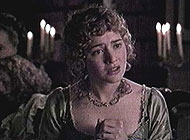|
|
|
|
Sense
and Sensibility
|
 |
|
The Jane Austen revival at the movies during the '90s seemed to have half the world cheering and the other half groaning. One thing is certain: whether or not the films in this cycle are any good, the rhetoric that accompanies them is decidedly dodgy. I turn pale at the absurd pronouncement that these Austen adaptations recapture the fine, classical, humanistic qualities that movies apparently once had, but have now lost. And if one more article suggests that Clueless (1995) transcended the teen movie genre because of its faint similarity to Austen's Emma, I will scream. The screen version of Sense and Sensibility, however, suggests that Austen mania indeed holds some modest pleasure. There is a great canniness in this adaptation, which is scripted by the film's star Emma Thompson. Women's lives – their emotions, struggles, differences – are placed front and centre of this tale. We encounter Mrs Dashwood (Gemma Jones) and her three daughters Elinor (Thompson), Marianne (Kate Winslet) and Margaret (Emilie François) at a moment when their station in the world is disturbed, and they must climb a few notches down the social ladder. These Dashwoods are a plucky lot. The film concentrates less on the financial hardship than their proud determination to fill their days with good humour and loyal friendship. Romantic love, and the prospect of finding a decent chap, are rather more vexing and divisive matters. The story centrally contrasts Elinor's "sense" – her contained, rational, withdrawn manner – with Marianne's florid "sensibility", an intensely expressed romanticism fanned by music and poetry. Winslet is especially captivating as Marianne. The casting of actors such as Hugh Grant and Hugh Laurie emphasizes the lightly ironic, comedy-of-manners side of Austen's tale. This inflection mercifully saves the film from the earnest sentimentality and lumbering pomposity of the worst Merchant Ivory period pieces. Thompson herself, in my view, is far more effective as a light comedian than as the gloomy tragedian of Carrington (1995). Sometimes the film leans too far towards a comedy of manners, particularly in its easy caricaturing of minor characters such as the wicked, scheming Fanny (Harriet Walter) or the vulgar, gossiping Mrs Jennings (Elizabeth Spriggs). And the filmmakers clearly suffer the curse that falls upon all literary adaptations: they can't easily hack out thirty minutes of minor plot details when the overall dramatic rhythm goes slack. Lurking beneath the surface of Sense and Sensibility are themes of emotional repression, deceit and tragic misunderstanding somewhat similar to those which ignited Martin Scorsese's adaptation of Edith Wharton's The Age of Innocence (1993). But here, under the fine direction of Ang Lee (The Wedding Banquet, 1993), these mildly angst-ridden events are given a fair-hearted lilt and a charming immediacy. The result is, for the most part, delightful. © Adrian Martin February 1996 |
![]()